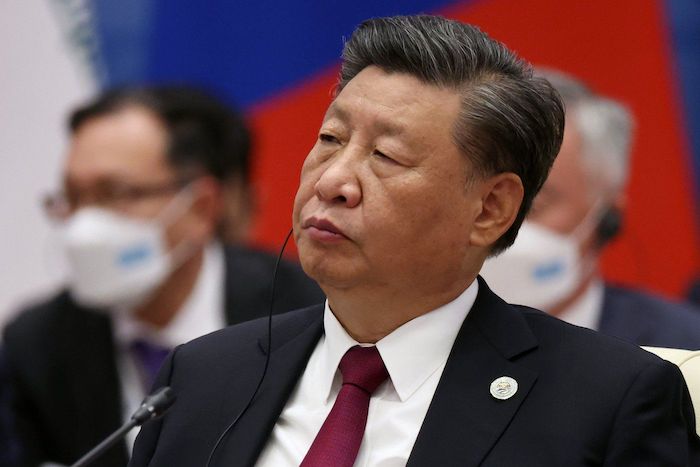Business
China’s Richest Are Desperate To Get Their Fortunes Out Of The Country By Any Means Necessary

From the Daily Caller News Foundation
China’s wealthiest citizens are resorting to dubiously legal methods to get their money out of the country as economic turmoil and a failing property market loom over the nation, according to the Wall Street Journal Wednesday.
The richest in the country are using various methods to circumvent the $50,000 foreign exchange limit, such as buying cryptocurrency, paintings or overpaying for imports among other methods, according to the WSJ. From the last half of 2023 to June this year, over $250 billion in assets has left the country, according to a WSJ analysis of Census and Economic Information Center data.
“Five or 10 years ago if you were a Chinese person you could put your money in real estate and have a way of growing your wealth,” Martin Rasmussen, senior strategist at research firm Exante Data told the WSJ. “That is not by any means attractive anymore.”
A similar outflow occurred in 2015 and 2016, with Chinese citizens purchasing over $200 billion in foreign assets, according to the WSJ in 2016.
China’s economic growth is projected to slow down by 4.5% in 2025, according to the International Monetary Fund (IMF) in May. The “ongoing housing market correction” is a large part of the economic downturn, as an estimated $18 trillion in value was wiped from the sector since 2021, according to the WSJ.
Top Chinese developer Evergrande was ordered to be liquidated in January by a Hong Kong court after it failed to restructure in the face of more than $300 billion in liabilities. Before the company’s collapse, China was already projected to hemorrhage at least $65 billion to foreign investments, with the Evergrande collapse accelerating the capital movement.
Beijing is publicly making examples of people it catches using illicit methods to transfer capital overseas, such as one group featured on state TV network CCTV that reportedly helped move $112 million worth of Chinese Yuan, according to the WSJ. The State Administration of Foreign Exchange also publishes records of people punished for violating its controls publicly.
Punishments usually include fines around half of the amount illegally transferred, or sometimes criminal charges, according to the WSJ.
Even for China’s ultra-rich with overseas connections, it’s getting harder to evade the government’s crackdown on capital leaving the nation, private bankers told the WSJ. The flight signals a lack of confidence in the economy as Chinese lawmakers feel the pressure to stabilize the currency and manage an aging population.
One method involves buying paintings to be sold in Hong Kong at an auction, but keeping the profit from the sale in U.S. currency on an offshore account based in the city, where the mainland’s capital controls don’t apply, according to the WSJ.
Newer methods to transport currency utilize cryptocurrency, which is bought by a third-party facilitator, stored on hard drives then converted to dollars overseas, according to the WSJ. While China banned crypto trading in 2021, crypto wallets are still allowed.
Internet
US government gave $22 million to nonprofit teaching teens about sex toys: report

From LifeSiteNews
The Center for Innovative Public Health Research’s website suggests teenage girls make their ‘own decisions’ about sex and not let their parents know if they don’t want to.
For almost a decade, the U.S. government funded a group that actively works to teach kids how to use sex toys and then keep them hidden from their parents to the tune of $22 million.
According to investigative reporter Hannah Grossman at the Manhattan Institute, The Center for Innovative Public Health Research (CIPHR) has been educating minors about sex toys with public funds.
Records show that the millions given to the group since 2016, according to its website, go toward “health education programs” that “promote positive human development.”
However, the actual contents of the programs, as can be seen from comments from CIPHR CEO Michele Ybarra, seem to suggest that its idea of “human” development is skewed toward radical sex education doctrine.
In 2017, CIPHR launched Girl2Girl, which is funded by federal money to promote “sex-ed program just for teen girls who are into girls.” Its website lets users, who are girls between ages 14 and 16, sign up for “daily text messages … about things like sex with girls and boys.”
The actual content of some of the messages is very concerning. Its website notes that some of the texts talk about “lube and sex toys” as well as “the different types of sex and ways to increase pleasure.”
The website actively calls upon teenage girls to make their “own decisions” and not let their parents know if they don’t want to.
Grossman shared a video clip on X of Ybarra explaining how they educate minors about the use of “sex toys” and dealing with their parents if they are found out.
The clip, from a 2022 Brown University webinar, shows Ybarra telling researchers how to prepare “young person(s)” for her research.
She said if they are doing “focus groups,” she will ask them, “Okay, so what happens if somebody comes into the room and sees words like penis and sex toys on your screen — on your computer screen or on your phone? What if it’s your mom?’”
In 2023, CIPHR launched Transcendent Health, which is a sex-education program for minors who are gender confused. This initiative received $1.3 million of federal grant money that expired last month.
Grossman observed that the federal government “should not fund programs that send sexually explicit messages to minors and encourage them to conceal these communications from parents.”
She noted that in order to protect children and “prevent further harm,” U.S. President Donald Trump’s Department of Health and Human Services “should immediately cancel CIPHR’s active contract and deny its future grant applications.”
“By doing so, the Trump administration can send a clear message: Taxpayers will no longer foot the bill for perverted ‘research’ projects,” she noted.
The Trump administration has thus far, through the Department of Government Efficiency (DOGE), exposed billions in government waste and fraud. Many such uses of taxpayer dollars are currently under review by the administration, including pro-abortion and pro-censorship activity through USAID, “Diversity, Equity, and Inclusion and neo-Marxist class warfare propaganda” through the National Science Foundation, and billions to left-wing “green energy” nonprofits through the Environmental Protection Agency.
Business
Canadian Police Raid Sophisticated Vancouver Fentanyl Labs, But Insist Millions of Pills Not Destined for U.S.

 Sam Cooper
Sam Cooper
Mounties say labs outfitted with high-grade chemistry equipment and a trained chemist reveal transnational crime groups are advancing in technical sophistication and drug production capacity
Amid a growing trade war between Washington and Beijing, Canada—targeted alongside Mexico and China for special tariffs related to Chinese fentanyl supply chains—has dismantled a sophisticated network of fentanyl labs across British Columbia and arrested an academic lab chemist, the RCMP said Thursday.
At a press conference in Vancouver, senior investigators stood behind seized lab equipment and fentanyl supplies, telling reporters the operation had prevented millions of potentially lethal pills from reaching the streets.
“This interdiction has prevented several million potentially lethal doses of fentanyl from being produced and distributed across Canada,” said Cpl. Arash Seyed. But the presence of commercial-grade laboratory equipment at each of the sites—paired with the arrest of a suspect believed to have formal training in chemistry—signals an evolution in the capabilities of organized crime networks, with “progressively enhanced scientific and technical expertise among transnational organized crime groups involved in the production and distribution of illicit drugs,” Seyed added.
This investigation is ongoing, while the seized drugs, precursor chemicals, and other evidence continue to be processed, police said.
Recent Canadian data confirms the country has become an exporter of fentanyl, and experts identify British Columbia as the epicenter of clandestine labs supplied by Chinese precursors and linked to Mexican cartel distributors upstream.
In a statement that appears politically responsive to the evolving Trump trade threats, Assistant Commissioner David Teboul said, “There continues to be no evidence, in this case and others, that these labs are producing fentanyl for exportation into the United States.”
In late March, during coordinated raids across the suburban municipalities of Pitt Meadows, Mission, Aldergrove, Langley, and Richmond, investigators took down three clandestine fentanyl production sites.
The labs were described by the RCMP as “equipped with specialized chemical processing equipment often found in academic and professional research facilities.” Photos released by authorities show stainless steel reaction vessels, industrial filters, and what appear to be commercial-scale tablet presses and drying trays—pointing to mass production capabilities.
The takedown comes as Canada finds itself in the crosshairs of intensifying geopolitical tension.
Fentanyl remains the leading cause of drug-related deaths in Canada, with toxic supply chains increasingly linked to hybrid transnational networks involving Chinese chemical brokers and domestic Canadian producers.
RCMP said the sprawling B.C. lab probe was launched in the summer of 2023, with teams initiating an investigation into the importation of unregulated chemicals and commercial laboratory equipment that could be used for synthesizing illicit drugs including fentanyl, MDMA, and GHB.
The Bureau is a reader-supported publication.
To receive new posts and support my work, consider becoming a free or paid subscriber.
Invite your friends and earn rewards
-

 2025 Federal Election2 days ago
2025 Federal Election2 days agoRCMP memo warns of Chinese interference on Canadian university campuses to affect election
-

 2025 Federal Election1 day ago
2025 Federal Election1 day agoResearchers Link China’s Intelligence and Elite Influence Arms to B.C. Government, Liberal Party, and Trudeau-Appointed Senator
-

 2025 Federal Election2 days ago
2025 Federal Election2 days agoThe status quo in Canadian politics isn’t sustainable for national unity
-

 2025 Federal Election1 day ago
2025 Federal Election1 day agoPoilievre Announces Plan To Cut Taxes By $100,000 Per Home
-

 Business2 days ago
Business2 days agoScott Bessent Says Trump’s Goal Was Always To Get Trading Partners To Table After Major Pause Announcement
-

 2025 Federal Election1 day ago
2025 Federal Election1 day agoTwo Canadian police unions endorse Pierre Poilievre for PM
-

 2025 Federal Election22 hours ago
2025 Federal Election22 hours agoCarney needs to cancel gun ban and buyback
-

 Business2 days ago
Business2 days agoStocks soar after Trump suspends tariffs







